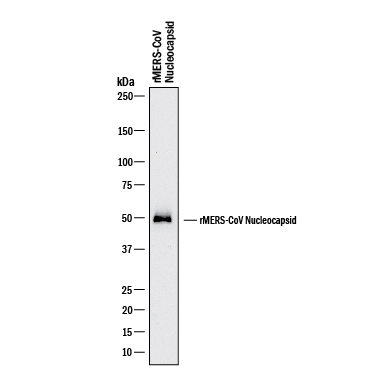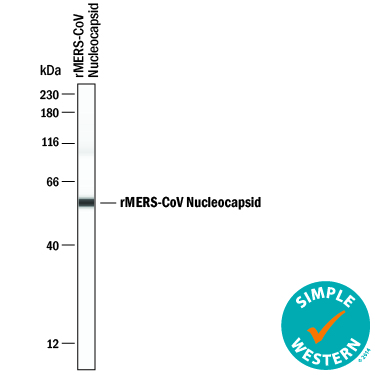MERS-CoV Nucleocapsid Antibody Summary
Met1-Thr411
Accession # YP_007188586.1
Applications
Please Note: Optimal dilutions should be determined by each laboratory for each application. General Protocols are available in the Technical Information section on our website.
Scientific Data
 View Larger
View Larger
Detection of MERS-CoV MERS-CoV Nucleocapsid by Western Blot. Western blot shows recombinant MERS-CoV Nucleocapsid protein. PVDF membrane was probed with 1 µg/mL of Mouse Anti-Mouse MERS-CoV Nucleocapsid Monoclonal Antibody (Catalog # MAB10729) followed by HRP-conjugated Anti-Mouse IgG Secondary Antibody (HAF018). A specific band was detected for MERS-CoV Nucleocapsid at approximately 49 kDa (as indicated). This experiment was conducted under reducing conditions and using Western Blot Buffer Group 1.
 View Larger
View Larger
Detection of Nucleocapsid by Simple WesternTM. Simple Western lane view shows recombinant MERS-CoV nucleocapsid, loaded at 0.2 mg/mL. A specific band was detected for Nucleocapsid at approximately 57 kDa (as indicated) using 25 µg/mL of Mouse Anti-MERS-CoV Nucleocapsid Monoclonal Antibody (Catalog # MAB10729). This experiment was conducted under reducing conditions and using the 12-230 kDa separation system.
Reconstitution Calculator
Preparation and Storage
- 12 months from date of receipt, -20 to -70 °C as supplied.
- 1 month, 2 to 8 °C under sterile conditions after reconstitution.
- 6 months, -20 to -70 °C under sterile conditions after reconstitution.
Background: Nucleocapsid
MERS-CoV, which causes the Middles East Respiratory Syndrome (MERS), belongs to a family of viruses known as coronaviruses that are commonly comprised of four structural proteins: Spike protein (S), Envelope protein (E), Membrane protein (M), and Nucleocapsid protein (N) (1). While the S, E and M proteins build up the viral envelope, the N protein is involved transcription, replication and packaging of the viral RNA genome into a helical ribonucleocapsid (RNP) (1, 2). The MERS-CoV N protein is a ~45 kDa protein composed of two independent structural domains connected by a linker region. The N-terminal region contains an Intrinsically Disordered Region (3) and an RNA binding domain (4), the linker region interacts with the M protein and the C-terminal region contains a self-association domain (1, 2). The MERS-CoV N protein shares 46.3% and 4.5% amino acid sequence identity with SARS-CoV-1 and SARS-CoV-2 N protein, respectively. MERS-CoV N proteins have been shown to inhibit Type I Interferon(IFN) production(1). In addition, the N protein is an abundant protein during coronavirus infection and displays high immunogenic activity, making it a promising therapeutic target (5-7).
- Li, Y. et al. (2019) Engineering. 5:940.
- Hurst, K. R. et al. (2009) J. Virol. 83:7221.
- Wang, Y. et al. (2015) Acta. Crystallogr. F. Struct. Biol. Commun. 71:977.
- Papageorgiou, N. et al. (2016) Acta. Crystallogr. D. Struct. Biol. 72:192.
- Che, X. Y. et al. (2004) J. Clin. Microbiol. 42:2629.
- Guan, M. et al. (2004) Clin. Diagn. Lab. Immunol. 11:287.
- Chang, C-K. et al.(2016) Drug Discov. Today. 21:562.
Product Datasheets
FAQs
No product specific FAQs exist for this product, however you may
View all Antibody FAQsReviews for MERS-CoV Nucleocapsid Antibody
There are currently no reviews for this product. Be the first to review MERS-CoV Nucleocapsid Antibody and earn rewards!
Have you used MERS-CoV Nucleocapsid Antibody?
Submit a review and receive an Amazon gift card.
$25/€18/£15/$25CAN/¥75 Yuan/¥1250 Yen for a review with an image
$10/€7/£6/$10 CAD/¥70 Yuan/¥1110 Yen for a review without an image

